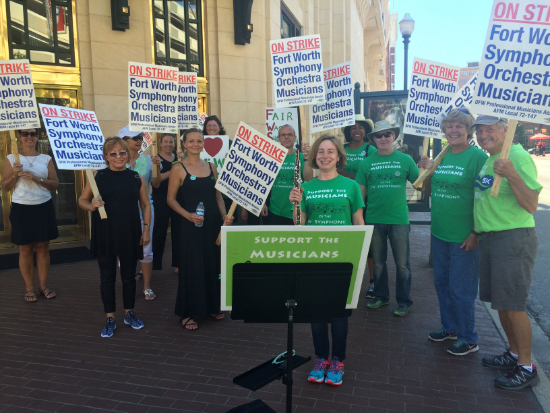
Photo credit: Dwight Vasel
On September 8, 2016, after 15 months of unproductive negotiations, the musicians of the Fort Worth Symphony Orchestra left the stage of the Bass Performance Hall, walked outside, and replaced bows and bocals with picket signs. The decision to strike was painful, but we had reached our breaking point.
The Fort Worth Symphony Orchestra has a relatively short history. Founded in 1925 as a community orchestra, we began our transformation into a professional symphonic orchestra in 1976-77, when Music Director John Giordano hired nine full-time musicians to form the core of the ensemble. Very quickly, more full-time musicians were hired and a chamber orchestra—the Texas Little Symphony (TLS)—began touring, playing education programs, and performing a subscription series. In addition, the TLS acted as the core of the Fort Worth Symphony Orchestra to perform full orchestra concert series. During the 1990s, the orchestra continued to grow—part-time musicians were converted to full-time, the chamber orchestra was replaced by a full-time symphony orchestra, and each successive contract contained growth in salary and, often, weeks of work. In pushing for more performance opportunities, the musicians inspired a very successful five-week summer series of outdoor concerts, which this year earned record profits for the organization. The FWSO Players Association transitioned from membership in ROPA to ICSOM. In 2008, with a base salary of over $60,000 and a 52-week season, the Fort Worth Symphony performed at Carnegie Hall. Patrons and donors were happy, the musicians were happy, and the administration proudly broadcast our success to the community.
In 2010 the tide turned, as it did for so many Americans during the recession. The orchestra lost donors, its endowment shrank, and the Texas Ballet Theatre stopped using live music and replaced our orchestra with recorded music. The direct result was a loss of six paid weeks of work. At negotiations that year, we took a 13.5% pay cut to help the administration, and looked forward to working together for growth once the economy stabilized and the ballet returned.

Jennifer Corning Lucio, Principal Oboe, with musicians and supporters of the FWSO
Photo credit: Karen Hall
The motto of our negotiations—and this strike—is “Growth Not Cuts”. Growth never materialized after 2010, and our musicians can no longer subsidize a failing administration with cuts to our salary, our benefits, and our season. The management’s final proposal would put our salaries more than $20,000 less than the national average, and about $40,000 less than our neighbors in the Dallas Symphony. It would reduce our salary back to what we made in 2003, and by 2020, our salary would still be 5% below what it was in 2010.
Health insurance is a major concern, as it is extremely expensive for our musicians to insure their families on our health plan. Family coverage costs $1746 a month, and a musician pays the entire cost of the premium. With management’s proposed cuts, this would represent nearly 42% of a musician’s gross annual salary.
The FWSO is also the only major orchestra in the United States that offers no disability insurance. Since 2010, musicians have been retiring at twice the rate of the previous decade. One of the major reasons given was that they were experiencing injuries from overwork. By proposing that musicians perform over 200 concerts in 43 paid weeks instead of 46—for comparison the Dallas Symphony played 156 concerts in 52 paid weeks in 2015—the FWSO Management is effectively endangering the long-term health of each of its musicians, while leaving the musicians without an option for addressing inevitable health issues related to performing.
The combination of steep healthcare costs and a lack of disability coverage puts the FWSO at the bottom of the country’s top 50 orchestras in terms of benefits offered. The bottom line is that the best musicians will no longer move to Fort Worth.
Repeated salary cuts will also cause severe non-financial damage to our orchestra. We are already seeing the effects. Since the 13.5% pay cuts in 2010, as noted, musicians have been leaving the FWSO at twice the rate of the previous decade. Further salary cuts will result in more musicians leaving and this increase in turnover can’t help but lead to instability and inconsistency in performances.
We have not been sitting idly by waiting for our management to find avenues for growth. Countless hours have been spent in committees with our management and board discussing the strategic plan (there is none past 2017), health insurance (we are told they are unable to switch to a different plan), artistic issues, and outreach and programming ideas. For years, the musicians have been in the lobby of Bass Hall before every subscription concert meeting patrons. After pressure from the orchestra, Michael Kaiser and the DeVos Institute were hired to do a comprehensive analysis of the FWSO. This was completed in May of 2012, and the strategic plan can be found on the FWSO website. Few of their recommendations were followed, particularly those about staffing and supporting our Development department.
The proposed cuts of weeks from our season are particularly unreasonable. As has been discussed, the contractual loss of six paid weeks of work in 2010 was a direct result of losing six weeks of work from our partnership with Texas Ballet Theater. Three weeks with the ballet have since been regained, yet our management is demanding that we play the additional work while cutting three more weeks of the season. Management intends to reduce our season to 43 weeks while still producing the same number of concerts. Although they claim they are only cutting three weeks of “vacation days”, we feel that these are in actuality scheduled non-work days that are essential for our physical recovery. As a strategy to save money, the musicians find it foolhardy to cut the number of physical recovery (“vacation”) days, as it will cause more injuries, thus costing the orchestra even more money. It will drive even more of us to leave the FWSO out of fear of career-ending injuries.
There hasn’t been an endowment campaign since 2000 and no public fund drive has been launched to remedy a $500,000 deficit. With our healthy economic environment in North Texas, increases in ticket sales, and continuing excellent reviews, the musicians simply cannot accept another regressive contract. To do so would be to agree that there is no hope for growth. We remain steadfast in our confidence Fort Worth can support a first-class Orchestra.
The Author is a member of the FWSO Newsletter Committee, and would like to thank the FWSO Media Committee and Randy Whatley for assistance in preparing this report.





